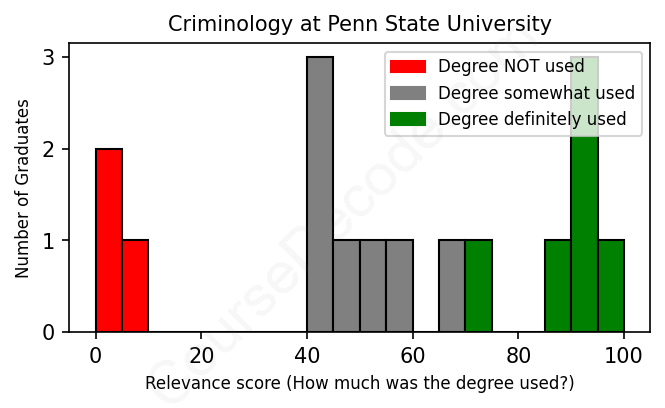
First, some facts. Of the Criminology graduates from Penn State University we've analyzed , here's how many have used (or NOT used) their degree in their career:

These are estimates based on AI analysis of 16 LinkedIn profiles (see below).
The verdict? Significantly below average. Overall, with an average relevance score of 55%, Criminology graduates from Penn State University have a much lower likelihood (-12%) of finding work in this field compared to the average graduate across all fields:
And for comparison, here's the chart for all profiles we've looked at across all degrees.
Also, after graduating, 37% of these graduates have pursued further education other than another Bachelor's degree (such as a Masters degree or other), compared to the average across all profiles of 35%. This suggests you may need more than just a Bachelors degree to be competitive as a Criminology graduate.
See the details:
|
Relevance score: 40% We think this person has NOT gone into a career related to their degree. We think this person has NOT gone into a career related to their degree.
DEGREE INFOGraduated in 2020 from Penn State University with a Bachelor's degree in Criminology. No other secondary education since. JOB HISTORY SINCE GRADUATIONDatabase Development & Management Intern Flip Learning Aug 2020 - May 2021 Partner Alliance Specialist  Carahsoft Apr 2021 - Present ABOUTNo information provided. |
The top 10 most common jobs done by the graduates we've analyzed (ranked most common to least) are:
After looking through the LinkedIn profiles of people who've graduated with a Criminology degree from Penn State University, it seems like a lot of them ended up in roles tied to law enforcement, legal assistance, and loss prevention. Many individuals found their way into jobs like Loss Prevention Officers at retail stores, which directly relate to crime prevention – so that’s a definite win for using their degree. Others moved into legal roles like paralegals or judicial positions, which also make good use of criminological knowledge about the legal system and justice processes.
However, there’s a noticeable chunk of graduates who took on jobs that don’t really connect back to criminology at all. Lots of them worked in retail, customer service, or administrative roles that require skills not necessarily tied to understanding crime or criminal behavior. It’s a bit mixed, really. While some are utilizing their criminology knowledge effectively, there are quite a few who seem to be veering away from the core principles of their field and ending up in jobs that, while paying the bills, don't directly relate back to what they studied. So, if someone is looking to enter the criminology field, they might want to seek those positions that really capitalize on their education!
Here is a visual representation of the most common words in job titles for Criminology graduates (this is across all Criminology graduates we've analyzed, not just those who went to Penn State University):

When looking at the career paths of Criminology graduates from Penn State University, it seems like their journeys are a bit of a mixed bag. A lot of the graduates started their careers in entry-level positions, with many taking roles in areas like sales, loss prevention, or administrative assistance shortly after graduation. It’s not uncommon for them to find their first job outside of direct criminology-related fields, like being a sales associate or a paralegal intern. However, some of these roles do connect back to their degree, especially those in law, security, or investigations, which might give them relevant experience even if it’s not the dream job right out of the gate.
Fast forward five to ten years, and it looks like some graduates manage to climb the ranks in fields related to their studies. For example, many who started in loss prevention have ended up in supervisory roles or even specialized positions in big companies like Amazon and Target. Others have successfully transitioned into law-related fields as paralegals or attorneys. That said, there are also cases where graduates veer off into unrelated sectors, such as sales or administrative roles that don't quite tap into their criminology background. Overall, while some graduates find solid careers aligned with their degree, others seem to end up in various positions that might not directly utilize their criminology knowledge. So, if you’re thinking of studying criminology, it’s good to keep an open mind about the types of job paths you might take after graduation!
Honestly, a Bachelor’s degree in Criminology at Penn State (or anywhere, really) can be pretty manageable, especially if you're interested in the subject. You’ll have to dive into some theories, research methods, and maybe even a few legal concepts that can get a bit dense. However, if you like analyzing behavior and understanding societal issues, it can actually be really engaging. The workload is similar to what you'd find in most social science degrees, so while it might not be a walk in the park, it’s definitely not the toughest major out there either. Just stay organized, keep up with your readings, and you should be just fine!
Most commonly, in the LinkedIn profiles we've looked at, it takes people 4 years to finish a Bachelor degree in Criminology.
Looking at the job paths of these Penn State Criminology grads, it seems like they’ve had a mixed bag when it comes to making decent money. Some have worked their way up into managerial positions, like the Loss Prevention folks who climbed the ladder at big retailers or those transitioning into specialized roles in government and law-related fields, which usually pay better. However, others have had jobs that are pretty entry-level or non-specialized, which don't tend to pay too well, especially early in their careers. Overall, while some are doing quite well, especially in law or higher management, a few are stuck in roles that likely aren't bringing in big bucks. It's all a bit of a rollercoaster depending on what path they took!
Here is a visual representation of the most common words seen in the "about" section of LinkedIn profiles who have a Bachelor degree in Criminology (this is across all Criminology graduates we've analyzed, not just those who went to Penn State University). This may or may not be useful:

Here are all colleges offering a Bachelor degree in Criminology (ordered by the average relevance score of their Criminology graduates, best to worst) where we have analyzed at least 10 of their graduates:
| College | Score | Count |
|---|---|---|
 California State University, Fresno California State University, Fresno
|
67 | 20 |
 George Mason University George Mason University
|
63 | 27 |
 Arizona State University Arizona State University
|
58 | 17 |
 Missouri State University Missouri State University
|
57 | 11 |
 The Ohio State University The Ohio State University
|
56 | 16 |
 Penn State University Penn State University
|
55 | 16 |
 Florida State University Florida State University
|
54 | 60 |
 West Virginia University West Virginia University
|
51 | 20 |
 University of Maryland University of Maryland
|
51 | 11 |
 John Jay College (CUNY) John Jay College (CUNY)
|
50 | 21 |
 University of South Florida University of South Florida
|
49 | 47 |
 Central Connecticut State University Central Connecticut State University
|
49 | 13 |
 University of Florida University of Florida
|
48 | 21 |
 The University of Texas at Dallas The University of Texas at Dallas
|
48 | 10 |
 Indiana University of Pennsylvania Indiana University of Pennsylvania
|
48 | 20 |
 Mississippi State University Mississippi State University
|
46 | 10 |